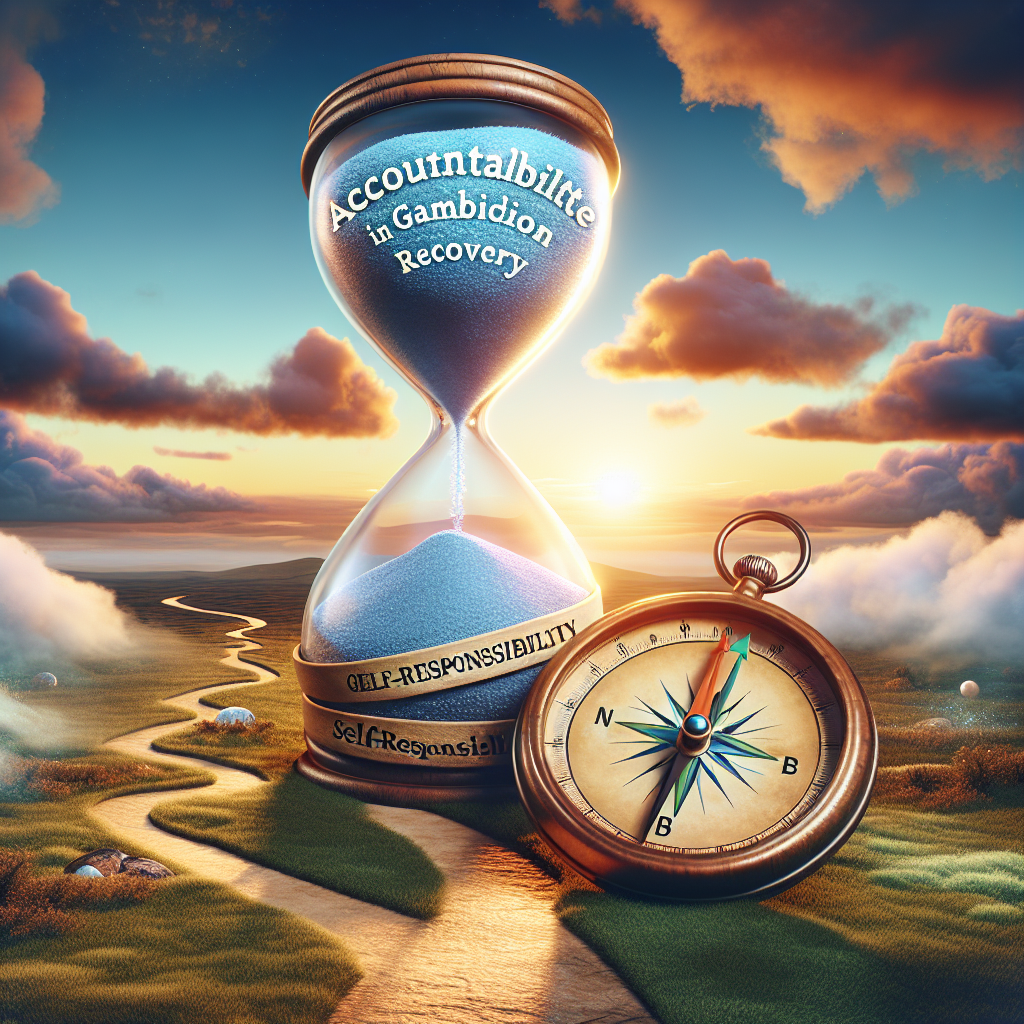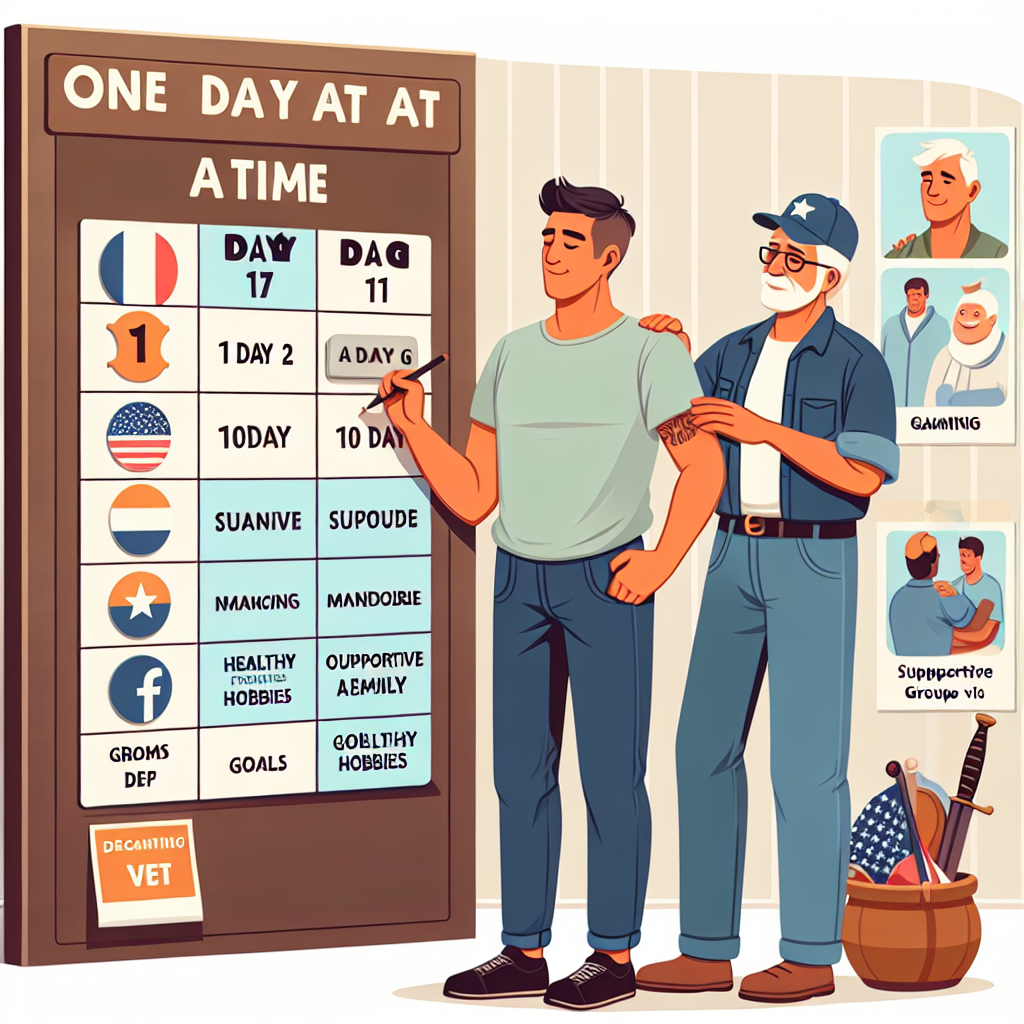-
Table of Contents

“Stay Strong, Stay Accountable: Your Path to Gambling Addiction Recovery”
Introduction
Staying accountable in gambling addiction recovery involves a multifaceted approach that includes personal commitment, support systems, and structured strategies. Personal commitment is crucial, as it requires the individual to acknowledge their addiction and actively work towards recovery. Support systems, such as therapy groups, family, and friends, provide emotional backing and practical advice. Structured strategies, including setting clear goals, maintaining a journal, and using financial controls, help in tracking progress and preventing relapse. Regular check-ins with a counselor or support group can reinforce accountability, while self-monitoring tools and apps can offer real-time feedback and encouragement. Combining these elements creates a robust framework that supports long-term recovery and helps individuals stay accountable to their goals.
Effective Strategies for Staying Accountable in Gambling Addiction Recovery
Staying accountable in gambling addiction recovery is a crucial aspect of the journey towards a healthier, more fulfilling life. Accountability serves as a foundation for maintaining progress and preventing relapse. One effective strategy for staying accountable is to establish a strong support network. Surrounding yourself with people who understand your struggles and are committed to helping you succeed can make a significant difference. This network can include family members, friends, support groups, or professional counselors. By regularly communicating with these individuals, you create a system of checks and balances that helps you stay on track.
Another essential strategy is setting clear, achievable goals. These goals should be specific, measurable, and time-bound, allowing you to track your progress and celebrate your successes. For instance, you might set a goal to attend a certain number of support group meetings each month or to save a specific amount of money that would have otherwise been spent on gambling. By breaking down your recovery journey into manageable steps, you can maintain a sense of accomplishment and motivation.
In addition to setting goals, it is important to develop healthy coping mechanisms. Gambling often serves as an escape from stress, anxiety, or other negative emotions. By finding alternative ways to cope with these feelings, you can reduce the temptation to gamble. Exercise, meditation, and engaging in hobbies are all excellent ways to manage stress and improve your overall well-being. Furthermore, practicing mindfulness can help you stay present and aware of your thoughts and emotions, making it easier to resist the urge to gamble.
Regularly reviewing your progress is another key component of staying accountable. Keeping a journal or using a recovery app can help you track your daily activities, emotions, and triggers. By reflecting on your experiences, you can identify patterns and make necessary adjustments to your recovery plan. This self-awareness allows you to stay proactive in addressing potential challenges before they lead to relapse.
Moreover, financial accountability plays a significant role in gambling addiction recovery. Creating a budget and sticking to it can help you regain control over your finances and reduce the temptation to gamble. You might also consider enlisting the help of a trusted friend or family member to manage your finances temporarily. By removing access to large sums of money, you can minimize the risk of impulsive gambling.
Another effective strategy is to educate yourself about gambling addiction and recovery. Understanding the psychological and physiological aspects of addiction can empower you to make informed decisions and develop effective coping strategies. Attending workshops, reading books, or participating in online forums can provide valuable insights and support.
Lastly, practicing self-compassion is essential for staying accountable in gambling addiction recovery. Recovery is a challenging and often non-linear process, and setbacks are a natural part of the journey. By treating yourself with kindness and understanding, you can maintain a positive mindset and stay committed to your goals. Remember that every step forward, no matter how small, is a victory worth celebrating.
In conclusion, staying accountable in gambling addiction recovery involves a combination of building a strong support network, setting clear goals, developing healthy coping mechanisms, regularly reviewing progress, maintaining financial accountability, educating yourself, and practicing self-compassion. By implementing these strategies, you can create a solid foundation for lasting recovery and a brighter future.
Building a Support System to Maintain Accountability in Gambling Addiction Recovery
Recovering from gambling addiction is a challenging journey that requires a strong commitment to change and a robust support system to maintain accountability. Building a support system is crucial for anyone striving to overcome this addiction, as it provides the necessary encouragement, guidance, and accountability to stay on track. One of the first steps in creating this support network is to reach out to family and friends who can offer emotional support and understanding. These individuals can play a pivotal role in your recovery by providing a listening ear, offering advice, and helping you stay focused on your goals.
In addition to leaning on loved ones, joining a support group specifically for gambling addiction can be incredibly beneficial. These groups, such as Gamblers Anonymous, offer a safe space to share experiences, challenges, and successes with others who understand what you are going through. The sense of community and shared purpose found in these groups can be a powerful motivator, helping you stay accountable to your recovery plan. Moreover, hearing the stories of others who have successfully overcome their addiction can inspire hope and reinforce the belief that recovery is possible.
Professional help is another critical component of a strong support system. Therapists and counselors who specialize in addiction can provide valuable insights and strategies to help you manage your urges and develop healthier coping mechanisms. Cognitive-behavioral therapy (CBT), for example, is a widely used approach that can help you identify and change the thought patterns that contribute to your gambling behavior. Regular sessions with a therapist can also serve as a form of accountability, as you will have someone to report your progress to and discuss any setbacks you may encounter.
Incorporating technology into your support system can also enhance your accountability. There are numerous apps and online resources designed to help individuals in recovery track their progress, set goals, and connect with others for support. These tools can provide daily reminders and motivational messages to keep you focused on your recovery journey. Additionally, some apps offer features that allow you to block access to gambling websites, further reducing the temptation to relapse.
Setting clear, achievable goals is another essential aspect of maintaining accountability in gambling addiction recovery. By breaking down your recovery into smaller, manageable steps, you can create a sense of accomplishment and momentum as you achieve each milestone. Sharing these goals with your support network can help ensure that you stay committed to them, as you will have others to hold you accountable and celebrate your successes with you.
It is also important to develop a routine that supports your recovery. Engaging in healthy activities, such as exercise, hobbies, and volunteering, can help fill the void left by gambling and provide a sense of purpose and fulfillment. By staying busy and focused on positive pursuits, you can reduce the likelihood of succumbing to the urge to gamble.
Finally, practicing self-compassion and patience is crucial in the recovery process. Understand that setbacks may occur, and it is essential to view them as opportunities for growth rather than failures. By being kind to yourself and seeking support when needed, you can build resilience and continue moving forward on your path to recovery.
In conclusion, building a support system to maintain accountability in gambling addiction recovery involves a combination of emotional support from loved ones, participation in support groups, professional help, the use of technology, goal-setting, and developing a healthy routine. By leveraging these resources and strategies, you can create a strong foundation for lasting recovery and a brighter future.
Q&A
1. **Question:** What role does a support group play in staying accountable during gambling addiction recovery?
**Answer:** A support group provides a community of individuals who understand the challenges of gambling addiction, offering emotional support, shared experiences, and encouragement to stay committed to recovery goals.
2. **Question:** How can setting personal goals help in maintaining accountability in gambling addiction recovery?
**Answer:** Setting personal goals helps by providing clear, measurable objectives to work towards, which can motivate individuals to stay focused on their recovery and track their progress, reinforcing their commitment to overcoming the addiction.
Conclusion
Staying accountable in gambling addiction recovery involves several key strategies: seeking support from therapy or support groups, setting clear and realistic goals, maintaining a daily journal to track progress, avoiding triggers, and establishing a strong support network of friends and family. Regularly reviewing progress and being honest about setbacks are also crucial for long-term success.



